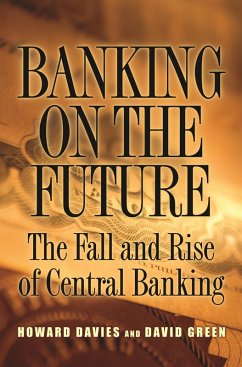An inside look at the role and future of central banking in the global economy
The crash of 2008 revealed that the world's central banks had failed to offset the financial imbalances that led to the crisis, and lacked the tools to respond effectively. What lessons should central banks learn from the experience, and how, in a global financial system, should cooperation between them be enhanced? Banking on the Future provides a fascinating insider's look into how central banks have evolved and why they are critical to the functioning of market economies. The book asks whether, in light of the recent economic fallout, the central banking model needs radical reform.
Supported by interviews with leading central bankers from around the world, and informed by the latest academic research, Banking on the Future considers such current issues as the place of asset prices and credit growth in anti-inflation policy, the appropriate role for central banks in banking supervision, the ways in which central banks provide liquidity to markets, the efficiency and cost-effectiveness of central banks, the culture and individuals working in these institutions, as well as the particular issues facing emerging markets and Islamic finance. Howard Davies and David Green set out detailed policy recommendations, including a reformulation of monetary policy, better metrics for financial stability, closer links with regulators, and a stronger emphasis on international cooperation.
Exploring a crucial sector of the global economic system, Banking on the Future offers new ideas for restoring financial strength to the foundations of central banking.
The crash of 2008 revealed that the world's central banks had failed to offset the financial imbalances that led to the crisis, and lacked the tools to respond effectively. What lessons should central banks learn from the experience, and how, in a global financial system, should cooperation between them be enhanced? Banking on the Future provides a fascinating insider's look into how central banks have evolved and why they are critical to the functioning of market economies. The book asks whether, in light of the recent economic fallout, the central banking model needs radical reform.
Supported by interviews with leading central bankers from around the world, and informed by the latest academic research, Banking on the Future considers such current issues as the place of asset prices and credit growth in anti-inflation policy, the appropriate role for central banks in banking supervision, the ways in which central banks provide liquidity to markets, the efficiency and cost-effectiveness of central banks, the culture and individuals working in these institutions, as well as the particular issues facing emerging markets and Islamic finance. Howard Davies and David Green set out detailed policy recommendations, including a reformulation of monetary policy, better metrics for financial stability, closer links with regulators, and a stronger emphasis on international cooperation.
Exploring a crucial sector of the global economic system, Banking on the Future offers new ideas for restoring financial strength to the foundations of central banking.









